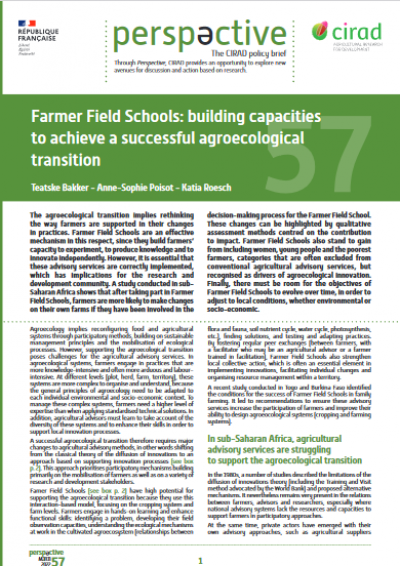You will find on this link the presentations from the panelists shared during the webinar:
The characteristics of the agro-ecological transition require transforming the way we accompany farmers in their changes of practices and production systems. Field schools are relevant participatory mechanisms for this, as they increase farmers' capacity to experiment, produce knowledge and build innovations themselves. However, there is a need to ensure the quality of implementation of these schemes, which has implications for research and development actors.
This webinar shared the findings of joint work by FAO, CIRAD (Centre International de Recherche Agronomique pour le Développement) and the NGO AVSF (Agronomes et Vétérinaires Sans Frontières), illustrated with three examples of field school programmes from Togo, Mali and India.
Presentation 1 : Field schools for the support of Agroecological Transition,
Présentation 3 : Field schools for Agroecological Discovery Learning in the Natural Farming Program in Andhra Pradesh,The agroecological transition implies rethinking the way farmers are supported in their changes in practices. Farmer field schools are particpatory mechanisms that build farmers’ capacity to experiment, to produce knowledge and to innovate independently. However, it is essential that these advisory services are correctly implemented, which has implications for the research and development community.
A study conducted in sub-Saharan Africa shows that after taking part in farmer field schools, farmers are more likely to make changes on their own farms if they have been involved in the decision-making process for the field school.
This webinar shared the findings of joint work by FAO, CIRAD (Centre International de Recherche Agronomique pour le Développement) and the NGO AVSF (Agronomes et Vétérinaires Sans Frontières), illustrated with three examples of field school programmes from Togo, Mali and India.
- Teatske Bakker, researcher in sistemic agronomy at the UMR Innovation at CIRAD
- presentation of the field schools in Togo: effects observed for farmers (trajectories of change in practices); recommendations for the conduct of field schools to support the Agroecological Transition
Presentation 2: Evidence of the implementation of field schools in Mali and first results of the plots,
- Marc Chapon, National Coordinator for AVSF in Mali
- presentation of the field schools system first results of the plots and perspectives.
Présentation 3 : Field schools for Agroecological Discovery Learning in the Natural Farming Program in Andhra Pradesh,
- Anne-Sophie Poisot, Coordinator of the Global Farmer Field School Platform, FAO
- Dharmendar Gogu RySS, Thematic Training Coordinator - RySS, Government of Andhra Pradesh, India
- Presentation of the video: Empowering rural communities through farmer field schools and agroecology
Presentation of the Agroeocology and Farmer Field Schools stocktaking,
A study conducted in sub-Saharan Africa shows that after taking part in farmer field schools, farmers are more likely to make changes on their own farms if they have been involved in the decision-making process for the field school.


No comments:
Post a Comment